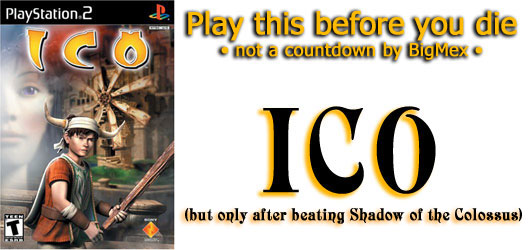
The ending was the reason I didn't touch the game again for months after beating it. I wasn't sure my heart take that type of punishment again. I don't mean the stress of fighting wave after wave of enemies in Ninja Gaiden. Or the pressure of entering a FPS match for big money. The punishment I mention was the emotional kind.
I'm a big guy as you may know. But I'm also a kid at heart, a big softy, I fall for the stories. The game I could beat without breaking a sweat. Anyone that knows their videogames and has played adventure titles could beat it too. The story got to me. It was the ending that beat me.
It wasn't a bad ending, but very melancholy. I wouldn't say bittersweet because you've just been had. A trick by Fumito Ueda to get you into his world. Subtle with his use of everything that goes into a great design, so subtle you don't even realize he's playing you, not the other way around. You fall for the game hook, line and sinker. At least I did.
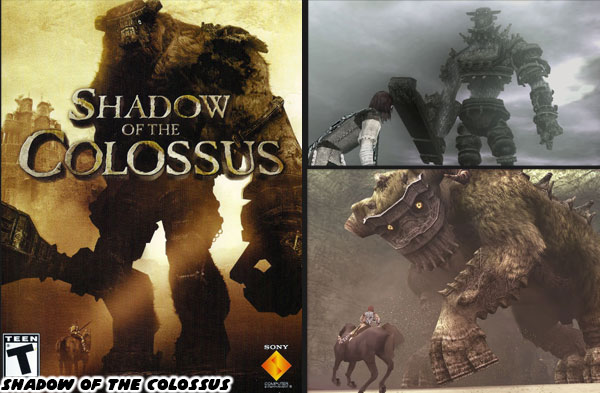
Jane Pinckard asked a long time ago when games would be able to disturb us. I never posted a comment on her blog. Shadow of the Colossus disturbed me, in the way she mentions. How could we keep playing a game if it was no longer "fun?" (ask GH about his Resident Evil 4 experiences). Take a step back and look at the themes that SotC conveys.
Wander is hurt for every colossus he defeats. The scars are quite visible by the end of the game. Is the life of Mono, the girl worth it? What about his self-sacrificing horse Agro? Was it his love or something else that kept us pushing forward? Maybe we just wanted to see what happens at the end. It is our own morbid curiosity that takes us there. It was then that I was unsettled by the outcome, when I was disturbed just a little.
Fumito Ueda is no fool. I've already said that he's carrying the Prince of Persia torch for Michael Ancel. There was a reason for his design, his plot and the outcome of the game. Shadow of the Colossus is not the end but rather the beginning of the legacy. It is supposed to be the prequel to Ico.
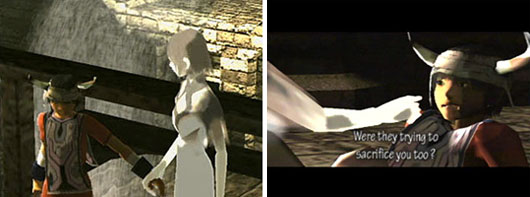
Ico is a child sent to a prison because he was born with horns. In the opening moments of the game you really feel sorry for the kid. He is a sympathetic character with wide eyes and a simple way about him. If and when the opportunity to escape arrives you are ready to lead him out of danger. That is until you realize that the mysterious castle in which you are trapped also has another prisoner, a princess named Yorda. In order to escape you have to take Yorda with you. Not that many a gamer would choose to be selfish and escape by themselves. In pursuit of Yorda are some shadowy monsters, sent to recapture her by Yorda's own mother, the Queen.
Talk about an epic adventure!
Ico is a puzzle game, practically a three dimensional retelling of Prince of Persia. You can see exactly where the SotC team learned their chops. You can see where other games like PoP the Sands of Time and God of War took some inspiration. The control in Ico is simple and intuitive, the puzzles are very clever, the graphics amazing and a straightforward plot that beats all. Ico is nothing short of a perfect game, it becomes epic when played right after SotC and not the other way around. Go on and play it again if you have it, pick it up if you don't.
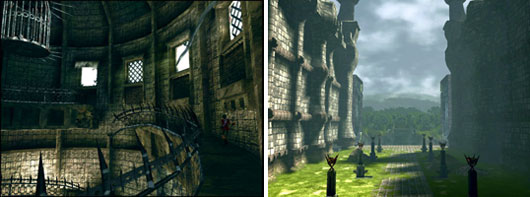
The environments will absorb you. This is part of the world that was on the other side of the forbidden valley in SotC. A castle built on an island, apart from an unseen kingdom in the woods. A giant stone monolith that was built ages ago, with some of the castle lying in ruin. You can tell that Ueda and his team were thinking of a fully-realized world when they began work on Ico.
As far as the eye can see there are details. Birds in the distance, the sound of crickets and frogs. Flowing water, an ocean, clouds and fog to change the mood of the level. All the while you lead Yorda, taking her hand and helping her through the labyrinth of a castle. Ueda says that holding hands is a very powerful symbol of affection in Japan, more so than in any other culture. Most couples just do not do that in Japan. So when Ico first takes Yorda's hand we see the beginnings of a romance. As gamers we have to do our best to get both characters away from the castle and the Queen. To see if they are given the chance to live their lives together, a fate complicated to Wander and Mono in SotC.
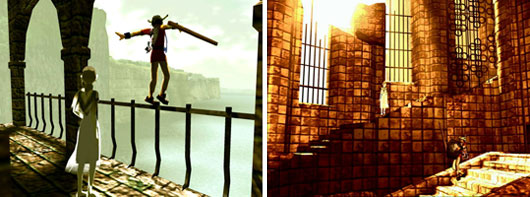
Ico teaches us to be brave in the face of adversity. To take a risk and yet always be mindful of using your brain. Every puzzle has a solution and we have to look and listen for the clues. Sometimes we have to leave Yorda behind to figure out how to escape a room, those few moments apart feel like an eternity. Will she be okay? Will the shadow monsters come for her in Ico's absence? Why should we care? After all she is just a polygon model, a device to get us from point-a to point-b.
If that's the case then we are playing games for all the wrong reasons.
Nintendo fanboys have nothing to get worked up over because Link will always save Zelda, whether they play the game or not. Gears of War is not really a battle to save humanity. The zombies aren't really killing people in Dead Rising. This is not really the Final Fantasy and Grand Theft Auto is not about the GT or the A.
Ueda is no fool. He plays with our emotions in Ico just as easily as he did in SotC and does so masterfully. Ico has an ending, something unique. While open to interpretation it is less melancholy than SotC.
For the scope of both games Ueda delivers a story that is the videogame equivalent to the Star Wars trilogies. What unsettled me in SotC was what could have been in the turn of Anakin Skywalker to Darth Vader. What worked in Ico was the redemption of Luke and his father. Had Lucas done it right the Anakin to Vader story should have disturbed audiences. Fortunately Ueda doesn't fall for the same traps, there are no Jar-Jar's, CGI does not replace plot and Han always shoots first.
The US version of Ico doesn't have the secrets found in the European and Japanese versions. It still delivers one hell of an experience. Ico is a game that everyone should play before they die, especially if they have just finished Shadow of the Colossus.
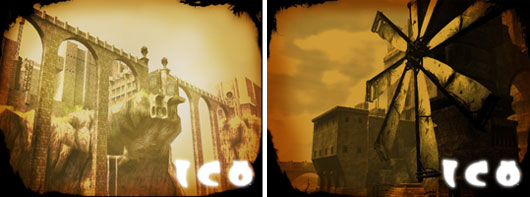
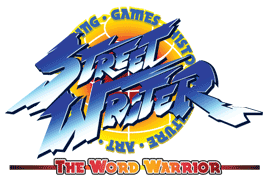
No comments:
Post a Comment